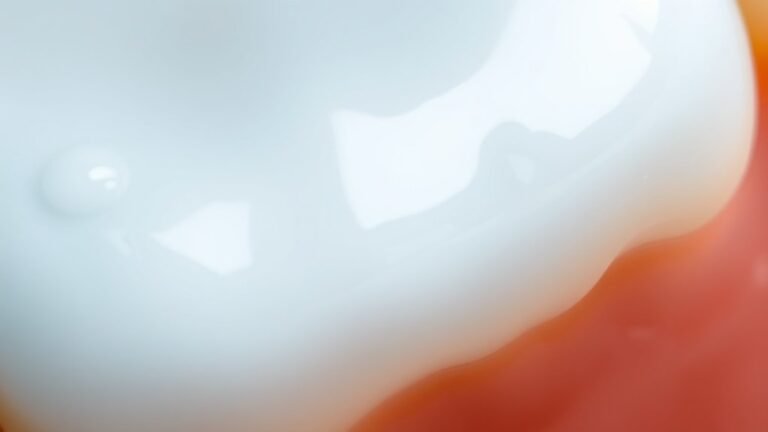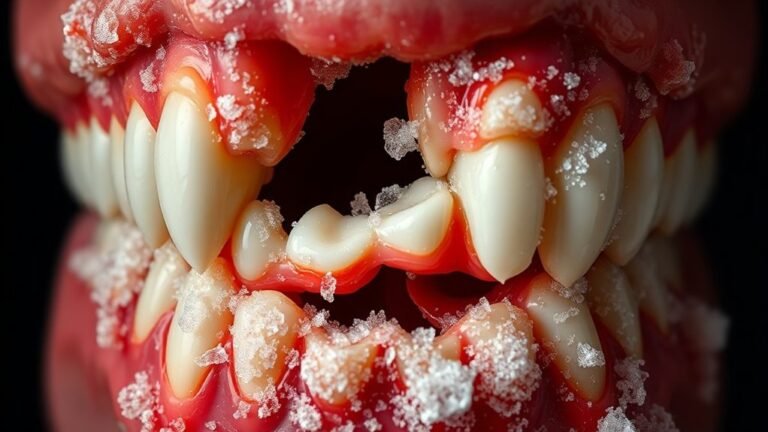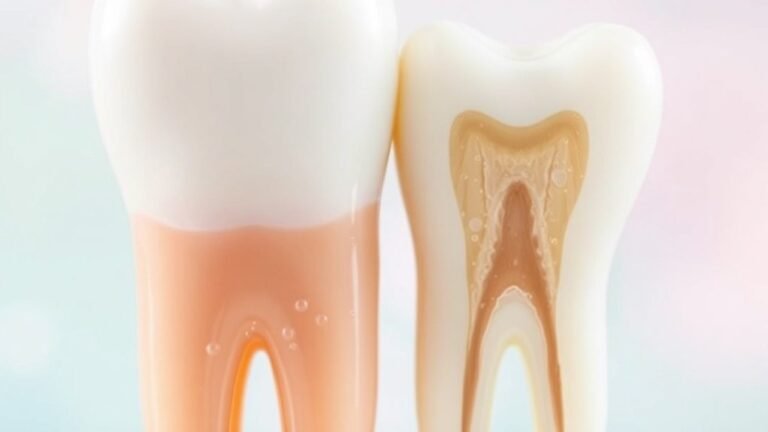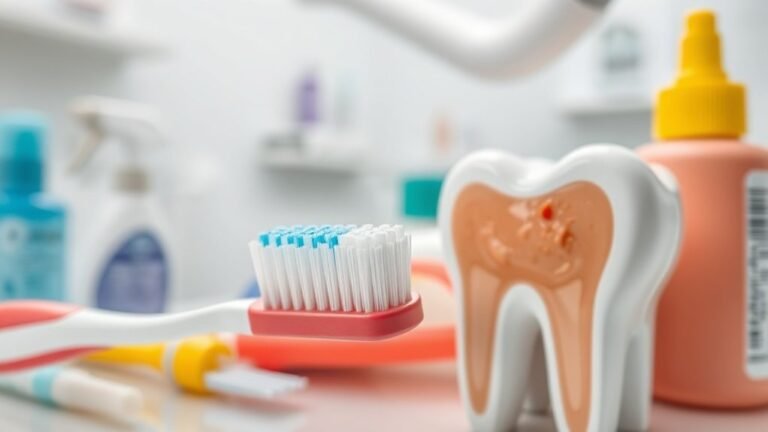Low Sugar Diets Starve Bacteria That Cause Tooth Decay
A low sugar diet effectively starves harmful bacteria like Streptococcus mutans, which cause tooth decay. When you cut back on sugar, you reduce the food source for these bacteria, leading to less acid production and fewer cavities. This shift promotes remineralization of your enamel, making your teeth stronger. Not only does this lower your risk of gum disease, but it also supports overall health. Discover additional strategies to enhance your dental health alongside a low sugar lifestyle!
Key Takeaways
- A low sugar diet reduces food sources for harmful bacteria, minimizing their ability to produce acids that cause tooth decay.
- Less sugar intake lowers the acidity in the mouth, promoting stronger enamel and reducing the risk of erosion.
- Fewer sugars lead to decreased plaque formation, lowering the chances of cavities and gum disease.
- Healthy snacks like whole fruits and nuts support a low sugar diet while providing essential nutrients for oral health.
- Good oral hygiene practices, combined with a low sugar diet, enhance the prevention of tooth decay and gum disease.
Understanding Tooth Decay and Its Causes
Tooth decay occurs when harmful bacteria in your mouth produce acids that erode tooth enamel, leading to cavities. One of the primary culprits is Streptococcus mutans, a bacteria that thrives on sugar. By adopting a low sugar diet, you can greatly reduce the sugar available for these bacteria, thereby enhancing tooth decay prevention. When you limit sugary foods and beverages, you create an environment that discourages these harmful bacteria from multiplying. Additionally, maintaining good oral hygiene habits, like regular brushing and flossing, complements your dietary efforts. This combination helps protect your enamel and keeps cavities at bay. Remember, making informed choices about your diet can play an essential role in preserving your dental health.
The Role of Sugar in Oral Health
Sugar plays an essential role in your oral health, influencing the balance of bacteria in your mouth. When you consume sugar, it feeds the harmful bacteria that can lead to tooth decay. However, reducing sugar can trigger bacteria starvation, promoting a healthier oral environment. Here are some key points to examine:
- Bacterial Growth: Sugar fuels harmful bacteria, causing imbalances in your oral microbiome.
- pH Levels: High sugar intake can lower pH, creating an acidic environment that erodes enamel.
- Plaque Formation: Sugar accelerates plaque buildup, leading to cavities and gum disease.
- Dietary Choices: Opting for low-sugar foods supports beneficial bacteria and strengthens your teeth.
How Sugar Fuels Harmful Bacteria
When you indulge in sugary foods and drinks, you’re not just satisfying your sweet tooth; you’re also creating an ideal environment for harmful bacteria to thrive in your mouth. These bacteria feed on sugar, producing acids that can lead to tooth decay. The more sugar you consume, the more these harmful microbes multiply, increasing your risk of cavities and gum disease.
| Type of Bacteria | Effect on Oral Health |
|---|---|
| Streptococcus mutans | Major contributor to tooth decay |
| Lactobacillus | Increases acid production |
| Actinomyces | Associated with gum disease |
| Prevotella | Linked to inflammation |
| Fusobacterium | Promotes plaque formation |
The Impact of Bacteria on Tooth Enamel
Although you might not realize it, the bacteria in your mouth can considerably impact the health of your tooth enamel. These tiny organisms play a vital role in the process of tooth decay. Here’s how they affect your enamel:
- Acid Production: Bacteria feed on sugars, producing acids that erode enamel.
- Plaque Formation: They create a sticky biofilm, known as plaque, which can harden and lead to cavities.
- Mineral Loss: Bacterial activity can disrupt the balance of minerals, weakening your enamel over time.
- Increased Sensitivity: As enamel wears away, you might experience heightened sensitivity to hot and cold.
Maintaining a healthy balance of bacteria is essential for protecting your enamel and ensuring your teeth stay strong and resilient.
Benefits of a Low Sugar Diet
Cutting back on sugar can substantially reduce your risk of cavities and improve your oral health. With fewer sugary snacks, you’re not only protecting your teeth but also enhancing your overall wellness. Embracing a low sugar diet can lead to a brighter smile and a healthier you.
Reduced Cavity Risk
Reducing sugar intake markedly lowers your risk of cavities, as sugar is a primary food source for the bacteria that cause tooth decay. By cutting back on sugar, you can enjoy several benefits:
- Decreased Bacterial Growth: Less sugar means fewer bacteria thriving in your mouth.
- Stronger Enamel: Your enamel can remineralize more effectively when sugar isn’t available to harm it.
- Fewer Acid Attacks: With less sugar, the acid produced by bacteria decreases, reducing the chances of enamel erosion.
- Longer-lasting Teeth: Maintaining a low-sugar diet helps guarantee your teeth remain healthy and cavity-free over time.
Improved Oral Health
A low sugar diet not only lowers your cavity risk but also contributes to overall improved oral health. By reducing sugar intake, you decrease the food source for harmful bacteria in your mouth, which helps maintain a balanced oral microbiome. This balance is vital for preventing gum disease and inflammation, keeping your gums healthy and your smile bright. Additionally, a diet low in sugar often leads to increased consumption of nutrient-rich foods, like fruits and vegetables, which provide essential vitamins and minerals for your teeth and gums. Better oral hygiene practices paired with a low sugar diet can greatly enhance your breath, reduce plaque buildup, and lead to fewer dental visits. Overall, you’ll enjoy a healthier mouth and more confident smile.
Enhanced Overall Wellness
When you embrace a low sugar diet, you’re not just protecting your teeth; you’re also enhancing your overall wellness. Cutting back on sugar can lead to a variety of health benefits that improve your quality of life. Here are four key advantages:
- Weight Management: Lower sugar intake helps control cravings and supports a healthy weight.
- Stable Energy Levels: You’ll experience fewer sugar crashes, keeping your energy levels consistent throughout the day.
- Reduced Inflammation: A low sugar diet can decrease inflammation, promoting better joint and heart health.
- Improved Mood: Balanced blood sugar levels can enhance your mood and reduce anxiety.
Foods to Include for Healthy Teeth
Incorporating a variety of nutrient-rich foods into your diet can greatly benefit your dental health. Focus on foods high in calcium, like dairy products, leafy greens, and almonds. These strengthen tooth enamel and bones. Crunchy fruits and vegetables, such as apples and carrots, help clean your teeth while stimulating saliva production, which neutralizes acids. Don’t forget about lean proteins like chicken and fish; they provide essential nutrients for gum health. Whole grains are also important, as they contain fiber that promotes healthy digestion. Finally, incorporate nuts and seeds for their healthy fats and minerals. By including these foods in your meals, you’ll not only support your overall health but also give your teeth the care they need.
Tips for Reducing Sugar Intake
Although reducing sugar intake may seem challenging, implementing a few simple strategies can make a significant difference in your diet and dental health. Here are some tips to help you cut back on sugar:
- Read Labels: Always check nutrition labels for hidden sugars in packaged foods; you might be surprised by how much sugar they contain.
- Choose Whole Foods: Opt for whole fruits, vegetables, and grains over processed foods; they’re naturally low in sugar and high in nutrients.
- Limit Sugary Drinks: Replace soda and sweetened beverages with water or herbal teas; this can dramatically lower your sugar consumption.
- Snack Smart: Instead of reaching for candy, choose nuts or yogurt; these options satisfy cravings without the sugar overload.
Alternatives to Sugary Snacks
Have you ever craved a sweet treat but wanted to skip the sugar? Luckily, there are plenty of delicious alternatives that can satisfy your sweet tooth without risking tooth decay. Consider snacks like fresh fruit, which provides natural sugars along with fiber and vitamins. Greek yogurt with berries is another great option; it’s creamy, satisfying, and packed with protein. If you’re looking for something crunchy, try nuts or seeds, which can offer a satisfying texture and healthy fats. You might also enjoy dark chocolate in moderation, as it contains less sugar and antioxidants. Finally, consider snack bars made with whole ingredients, like oats and dried fruits, to keep your energy up without the sugar crash.
Maintaining Oral Hygiene Alongside a Low Sugar Diet
To maintain your oral health while on a low sugar diet, daily brushing is essential to remove plaque and prevent decay. Flossing regularly helps keep your gums healthy and can reduce the risk of cavities between your teeth. Additionally, staying hydrated boosts saliva production, which naturally protects your teeth from acidity and bacteria.
Daily Brushing Importance
While adopting a low sugar diet can greatly reduce your risk of tooth decay, it’s essential to remember that daily brushing remains a critical component of maintaining oral hygiene. Brushing your teeth helps remove plaque and food particles, preventing bacteria from thriving. Here’s why you should keep up with your brushing routine:
- Prevents plaque buildup: Regular brushing helps eliminate the sticky film that can lead to cavities.
- Freshens breath: Brushing keeps your mouth clean and helps you avoid unpleasant odors.
- Strengthens enamel: Fluoride toothpaste can strengthen your tooth enamel, making it more resistant to decay.
- Promotes overall health: Good oral hygiene reduces your risk of gum disease and other health issues.
Stick to this routine, and your smile will thank you!
Flossing for Health
Flossing is just as essential as brushing when it comes to maintaining oral hygiene, especially on a low sugar diet. While reducing sugar intake limits the food supply for harmful bacteria, it’s still important to remove plaque and food particles that brushing alone might miss. Flossing daily helps prevent gum disease and cavities, which can still occur if food debris lingers between your teeth. Studies show that people who floss regularly experience a significant decrease in dental issues. By incorporating flossing into your routine, you enhance the effectiveness of your low sugar diet, ensuring a healthier mouth overall. So, don’t skip this critical step—make flossing a part of your daily hygiene practices for ideal oral health.
Hydration and Saliva Production
Maintaining proper hydration plays a significant role in oral hygiene, particularly when following a low sugar diet. Adequate water intake supports saliva production, which is essential for protecting your teeth against decay. Saliva neutralizes acids, washes away food particles, and provides necessary minerals for enamel repair. Here are four ways hydration aids your oral health:
- Promotes Saliva Flow: More water means more saliva, which helps combat bacteria.
- Aids Digestion: Proper hydration assists in breaking down food, reducing plaque formation.
- Prevents Dry Mouth: Staying hydrated avoids discomfort and protects teeth.
- Enhances Taste: A well-hydrated mouth improves your enjoyment of healthy, low-sugar foods.
Frequently Asked Questions
How Long Does It Take for Bacteria to Starve on a Low Sugar Diet?
It typically takes about 24 to 48 hours for bacteria to start starving on a low sugar diet. By reducing sugar intake, you create an environment where harmful bacteria struggle to thrive and multiply effectively.
Can a Low Sugar Diet Reverse Existing Tooth Decay?
A low sugar diet can help halt further decay, but it won’t reverse existing damage. Instead, focus on good oral hygiene and regular dental visits to support your teeth’s natural healing process and strengthen enamel.
Are There Any Risks to a Very Low Sugar Diet?
Yes, a very low sugar diet can lead to nutrient deficiencies, energy fatigue, and potential mood swings. It’s vital to balance your intake with healthy carbohydrates, ensuring you maintain overall health while reducing sugar consumption.
How Does a Low Sugar Diet Affect Overall Health?
A low sugar diet can improve overall health by reducing inflammation, lowering the risk of chronic diseases, and promoting weight management. You’ll likely experience increased energy levels and better mood stability as your body adjusts.
What Dental Products Support a Low Sugar Diet?
To support a low sugar diet, use fluoride toothpaste, sugar-free mouthwash, and xylitol-based products. These items help strengthen enamel, reduce harmful bacteria, and keep your mouth healthier, ensuring you maintain peak dental hygiene while cutting sugar.
Conclusion
By embracing a low sugar diet, you’re not just cutting calories; you’re launching a crusade against the villainous bacteria that threaten your teeth, much like a hero in a classic tale. This simple shift can dramatically improve your oral health and keep your smile bright. Remember, every bite counts—choose wisely to starve the harmful microbes and nourish your teeth instead. With mindful eating and good hygiene, you can safeguard your dental future and enjoy a healthier, happier smile.






